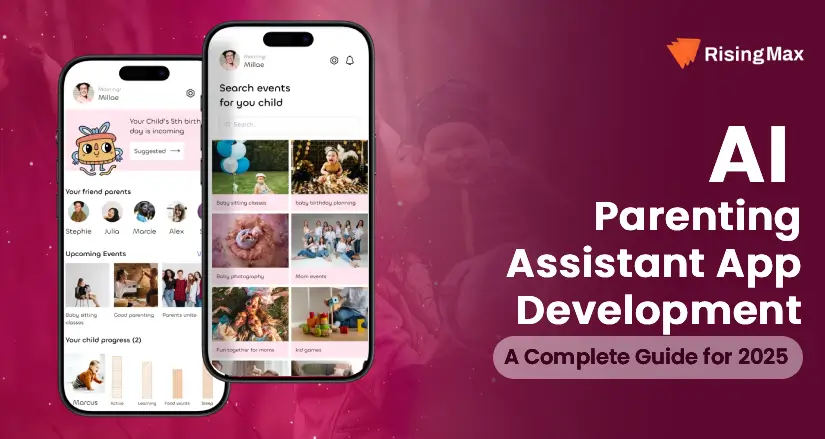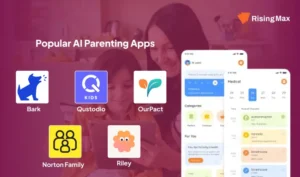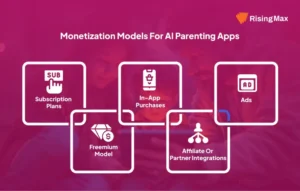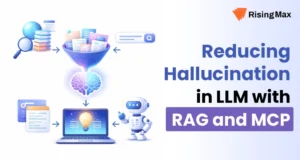Key Takeaways
-
The global parenting app market is projected to surpass $6.02 billion by 2035, with demand driven by safety, health, and digital balance needs.
-
AI Parenting app development cost can range from $8,000 to $140,000+, depending on feature set, tech stack, and app scope.
-
Modern AI parenting assistant apps combine monitoring, health tracking, learning support, and predictive insights, making them a one-stop tool for parents worldwide.
-
From real-time monitoring to personalized recommendations, AI parenting apps are transforming childcare into a smarter, safer, and more efficient experience.
Parenting is changing a lot with Artificial Intelligence. Families are now starting to rely on innovative solutions to make their daily lives smoother and safer. Now, AI parenting assistant apps are reshaping households by offering features that can help them balance responsibilities better. It includes real-time assistance, personalized recommendations, and automated reminders.
According to a survey, it is stated that the global parenting apps market is estimated to go beyond USD 6.02 billion by 2035. From tracking the growth of the child, managing schedules, screen time, to even emotional well-being, AI parenting assistant apps are now becoming a necessity.
So, are you looking to enter this domain as AI parenting app development in 2026 creates new and vast opportunities for startups and businesses? These AI assistant apps can offer accurate insights and support based on each child’s unique requirements. The demand for AI parenting apps is not just about comfort but also about making a safe and healthier environment for children.
In this blog, we will explain how parenting assistant apps are built, what features they include, how much they cost to build, what technical infrastructure is required, and where the market is headed in the future. If you are looking for a new opportunity to develop an AI parenting app, then this guide will prove to be useful for you.
What is AI Parenting App Development?
AI parenting app development involves creating applications powered by Artificial Intelligence that help parents better understand and manage the care, safety, and learning process of children. These apps serve not only as a monitoring tool but also as a guide for parents in the growth of children.
AI parenting apps perform various functions, such as monitoring activities, controlling screen time, and more. The aim of these AI parenting apps is to give parents instant information and help them make better decisions.
Examples of AI Parenting Apps
- Child Monitoring Apps: Track the activities and screen time of their children for safety.
- Digital Well-Being Apps: Promote appropriate use of devices and recommend routines.
- Personalized eLearning Apps: Suggest educational content based on a child’s interests.
- Health Tracking Apps: Monitor nutrition and growth schedules with reminders.
Global Relevance
The popularity of AI parenting app solutions is growing in every country. According to recent statistics, the global parenting app market for children can rise at a rate of more than 11.02% from 2025 to 2032.
Key Benefits
The key benefits of these AI parenting app development solutions include:
- Control and information on children’s online and offline activities.
- Regular reports on health and education.
- Timely alerts and suggestions.
- Easy and one-stop view for parents.
Thus, AI parenting app development balances safety and learning while understanding the changing needs of parents.
How AI is Transforming Parental Control Apps
The safety and learning needs of children have changed more than ever. Parents are no longer limited to just calls or messages, but they also want to keep an eye on their children through smart apps. AI in parenting has made monitoring easier, faster, and safer. Below are some major changes:
1. Real-Time Monitoring
AI technology examines a child’s activities, whether it’s offline or online. By tracking these activities, the app detects anomalies and flags issues.
2. Data-Driven Insights
Instead of traditional methods, now apps track children’s activities and habits, and give accurate suggestions about their emotional or psychological state. Parents can take timely action with this information.
3. Advanced Content Filtering
Earlier, it was only possible to block websites; now, with a smart AI app, this issue is solved as they provide safe and age-appropriate content for children. This allows children to access only useful things.
4. Contextual Alerts
With AI technology, parents get contextual alerts as well, besides generic notifications. For example, if a child accesses something that is restricted during study time, the app will notify the parents.
5. Identifying Cyberbullying
By examining the conversations, AI predicts the chances and presence of cyberbullying or a harmful interaction. This helps parents prevent potential risks.
6. Secure Cloud Storage
These AI-driven apps allow children’s information to be stored on a secure cloud. This reduces the risk of data theft, and parents can view old records anytime.
Why Invest in AI Parenting Assistant Apps in 2026?
The challenges related to raising children are changing every year. Today’s parents not only focus on studies and health, but also want to keep an eye on children’s safety, mental balance, and new habits towards the digital world. This is why the importance of parenting assistant apps has increased more than ever.
Growing Market Demand
The AI parenting app domain is rapidly rising as families look for better childcare solutions. The global market has already increased from $1.53 billion in 2024 to $1.72 billion in 2025. Moreover, according to a survey, 48% of respondents use parental control apps, which shows the requirement for personalised childcare.
Changing Parenting Challenges
Today, parents have to deal with many new issues like children’s screen time, digital safety, mental health, and learning habits. In such cases. AI parenting assistant apps can prove to be helpful as they provide parents with all the necessary information and tips on a single platform.
Opportunity in the Market
Parents are spending more than ever on their children’s education and care. According to recent trends, families are now preferring technology-based solutions that can balance both child learning and safety. This is creating new opportunities for businesses looking to enter into a new rising market. This domain can be profitable not only for new startups but also for established firms.
For all these reasons, 2026 can prove to be the golden year of digital solutions for parents and businesses that invest in this field now can gain a strong position in the coming years.
Key Features of an AI Parenting Assistant App
Today, parents are more conscious about their children’s education, health, and safety. A right AI parenting assistant app helps them do all this in an easy and organized way. Below are the features that businesses should incorporate in their AI control app solution:
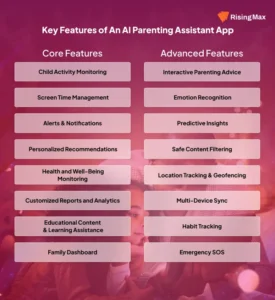
Core Features
1. Child Activity Monitoring
The AI parenting app should give clear information on children’s studies, play, sleep, and development activities throughout the day. The parents are expected to track all such things as time, location, and development milestones. This simplifies the process of them comprehending the way the child behaves and advising them accordingly.
2. Screen Time Management
Tracking the time spent by children on the screen is the most important feature in today’s digital era. The AI parenting app should allow parents to decide when and for how long the child can use the mobile or tablet. This keeps both studies and health balanced.
3. Alerts & Notifications
Add a feature in your custom AI parenting app solution where parents get instant notifications of whatever their child is doing, like screen time limit, new updates, and more. It helps in taking quick and right action.
4. Personalized Recommendations
The AI parental control app should provide suggestions for learning, development, or play-based activities based on your child’s behavior, age, and needs. For example, advice them to sleep on time or suggest outdoor activities if they are using the phone too much.
5. Health and Well-Being Monitoring
This feature monitors your child at every activity such as sleep, diet, and all the daily motions. Parents are able to see all the information at a single location and take essential action, such as visiting a doctor.
6. Customized Reports and Analytics
In AI parenting apps, there should be a feature of weekly and monthly reports where parents can view and get a clear picture of what their child is learning and the development milestones they have crossed. This makes it easy for parents to recognize patterns and take appropriate decisions.
7. Educational Content & Learning Assistance
Age-appropriate content or gamified activities for children make learning fun and safe, but there should be a feature where parents decide on what content the child should access and for how much time.
8. Family Dashboard
This feature gives the option of data and settings on a single screen for the whole family. The facility to create profiles of different children and set rules according to their needs saves time.
Advanced Features
1. Interactive Parenting Advice
AI studies a child’s routines and behavior to provide personalized assistance to the parents. As an example, when a toddler has issues with sleeping, it suggests relaxing before sleep activities and sound sleeping tips.
2. Emotion Recognition
With AI, parents can understand the mood or emotions of their children based on their messages, calls, or video activities, making them more aware. This makes it possible to understand the mental health of children and talk on time.
3. Predictive Insights
By looking at the patterns of children’s behavior, studies, or health, it is easy to plan the necessary steps in the future. For example, a warning can be received in advance if the screen time increases continuously.
4. Safe Content Filtering
The AI control app should block inappropriate or harmful content. This assures parents that only the right content reaches the child’s device.
5. Location Tracking & Geofencing
The app should give information immediately if the child has crossed the designated area or location with the routes they are taking. This helps in taking the right actions if there is any problem.
6. Multi-Device Sync
This feature gives parents the option to run the AI parenting assistant app simultaneously from mobile, tablet, and computer. With this, both parents can monitor the child from anywhere and at any time.
7. Habit Tracking
Tracking the child’s growth, play, sleep-wake time, or new cognitive skills helps parents make long-term plans. This helps parents to know about any developmental delay early.
8. Emergency SOS
If the child is facing any kind of problem or issue, they can send an alert to the parents by pressing a button. This feature is very important from a security point of view.
Key Pillars of an AI Parenting App
Features alone are not enough to build a successful AI Parenting App. Its backbone is three strong pillars that make the app reliable, safe, and useful for parents. These three building blocks balance technology, data, and experience.
1. Data Collection and Management
The most important basis of an AI Parenting App is data. The app collects information about children’s activity. This data is kept on a secure server so that parents can view it at any time.
- A transparent data collection policy increases parental trust.
- Having the right data allows the AI model to better understand children’s behavior and patterns.
- In various countries, it is mandatory to follow laws like COPPA and GDPR.
2. Smart Analysis and Insights
After collecting the data, AI examines it in depth and gives clean reports or suggestions to parents.
- Clear insights are available on children’s screen time habits, sleep patterns, and location movements.
- An early warning can be received about the possibility of future dangers or changes.
- Parents can make a balanced plan for children’s health, education, and digital safety.
3. User-Friendly Interface and Experience
It is very important that the AI parenting assistant app is simple to use for parents.
- A clean dashboard where all the information about the child is visible in one place.
- Simple language, easy navigation, and customizable settings make parents feel comfortable.
- Multi-device support (mobile, tablet, desktop) allows parents to log in anywhere.
How to Develop an AI Parenting App?
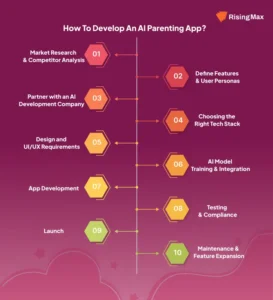
In order to develop the most successful AI parenting app by 2026, the step-by-step approach should be followed with a clear plan and strategies.
Market Research & Competitor Analysis
The first step is to have a complete understanding of the market and competitor apps. It is important to know what problems parents are facing and what features are working or not in existing apps.
- Understanding the pain points of parents and their preferences.
- Examining the features, reviews, and ratings of popular apps.
- Identifying opportunities to offer new features or better experiences.
Define Features & User Personas
The next step is to clarify who will use the AI-powered parental app and how. The features may be needed by new parents, parents of school-going children, and parents of teenagers. Therefore, it is better to establish your target audience at the beginning, or determine whether you will create the same AI-based parental control app for all users.
- Determining the features according to each user group.
- Focus on security, education, health, and digital balance.
- Making the user experience easy and seamless.
Partner with an AI Development Company
After deciding on who the target audience will be and the features, the next step should be to connect with an AI development company, because a well-known company guarantees that the app will be developed with the appropriate technologies and your requirements.
- Access to expert guidance in AI model selection and integration.
- Quicker development timelines with best practices.
- Reduced risks through compliance support and security expertise.
Choosing the Right Tech Stack
The speed, security, and scalability of the AI parenting app depend on the right technology stack.
- Flutter or React Native for mobile app development.
- TensorFlow or PyTorch for AI and machine learning.
- Firebase, AWS, or Azure for data storage and cloud.
- IoT devices like smartwatches or baby monitor integration, if required.
Design and UI/UX Requirements
The interface of the AI parent control app should be simple and highly responsive so that parents can easily understand and use it.
- Clear and precise dashboard, fewer screens, and big buttons.
- Overview of all children’s activities on a single screen or dashboard.
- Color scheme and font size should be easy to use and not heavy on the eyes.
AI Model Training & Integration
The next step is building and deploying intelligent models. This stage equips the app with smart decision-making and adaptive capabilities.
- Gathering secure, anonymized insights from user activities.
- Utilising advanced algorithms like NLP for predictive analysis.
- Continuously refining models to deliver timely alerts and guidance.
App Development
With the AI models ready, the next phase is to build the AI parenting app, implementing the functionality into a fully operational product. This guarantees the app is smooth, secure, and responsive.
- Converting wireframes and designs into interactive screens and features.
- Integrating backend systems, databases, and cloud services.
- Ensuring the app works smoothly across devices.
Testing & Compliance
The parenting AI app must be thoroughly tested and compliant with privacy regulations before launch.
- Testing that all features are working properly.
- Compliance with data privacy and security regulations (COPPA, GDPR, HIPAA).
- The app must not slow down or freeze during real-time monitoring.
Launch
Publishing the app to the store and making it accessible to the users is highly significant since an effective launch plan is essential.
- Testing the demo version with a small user group first.
- Promotion through social media, blogs, and paid campaigns.
- Making small changes based on initial feedback.
Maintenance & Feature Expansion
The work doesn’t end after launch. Regular updates and security patches make the AI parenting assistant app reliable for a long time.
- Bug fixes and security improvements.
- Adding new features based on user feedback.
- Server and cloud upgrades to maintain scalability and performance.
This expanded process makes it clear that AI Parenting App is not just a solution but a strategic and continuous improvement process. Without the right planning, technology, and testing, the app cannot become useful and reliable for both parents and children.
Advanced Tech Stack For AI Parenting App Development
The selection of an appropriate technology stack is very crucial to develop an AI Parenting App. It defines the speed of the app, the level of security, scalability, and the possibility of adding new functionalities in the future.
1. Programming Languages
Frontend (User interface):
- Flutter: For cross-platform apps.
- React Native: Fast and easy for both iOS and Android.
Backend (server side):
- Python: For AI and data processing.
- Node.js: For building fast and scalable APIs.
- Java / Kotlin: For Android apps.
- Swift: For iOS apps.
2. AI & Machine Learning Frameworks
- TensorFlow: For model training and integration.
- PyTorch: For deep learning and pattern analysis.
- Scikit-learn: For data analysis and basic AI algorithms.
- OpenCV: Video and image-based motion or emotion recognition.
3. Database & Storage Solutions
- Firebase: For real-time data and authentication.
- MongoDB: Scalable NoSQL database.
- MySQL/PostgreSQL: For structured data.
- Cloud Storage: AWS S3, Google Cloud Storage.
4. Cloud & Hosting Solutions
- AWS/Azure/Google Cloud for scalability, security, and backend APIs.
- Serverless Architecture: Lambda, Cloud Functions for fast and cost-effective.
- CDN (Content Delivery Network): To give a faster experience to users.
5. IoT Integration
- IoT integration for smartwatches, fitness bands, and baby monitors.
- Real-time monitoring of children’s location, health, and activity.
- Data synchronization for alerts and notifications.
6. Security & Compliance Tools
- Encryption: AES, SSL/TLS to protect data.
- Authentication: OAuth, JWT token-based login.
- Compliance: Compliance with COPPA, GDPR, HIPAA regulations.
- Monitoring Tools: CloudWatch, Sentry.
| Category | Technologies / Tools |
| Programming Languages | Flutter, React Native, Python, Node.js, Java/Kotlin, Swift |
| AI & ML Frameworks | TensorFlow, PyTorch, Scikit-learn, OpenCV |
| Database & Storage | Firebase, MongoDB, MySQL/PostgreSQL, AWS S3, Google Cloud Storage |
| Cloud & Hosting | AWS, Azure, Google Cloud, Serverless (Lambda, Cloud Functions), CDN |
| Security & Compliance | AES, SSL/TLS, OAuth, JWT, COPPA, GDPR, HIPAA, CloudWatch, Sentry |
Why Data Matters in Modern AI Parenting Apps
Parenting apps are based on data. Accurate data helps in providing personalized suggestions and recommendations.
Data Gathering
- Connected Devices: Smart watches, baby monitors, and health trackers provide data on daily activities.
- Entered Details: Parents enter details like eating habits or emotional notes in the AI parenting assistant app.
- Smart Sensors: Cameras and sensors instantly capture information.
- In-App Behavior: How kids use educational tools or games in an app can reveal their interests and learning speed.
When this data is captured and used accordingly, apps can provide accurate suggestions for kids.
Global Compliance Every AI Assistant App Must Follow
These parenting AI apps operate in different countries, so they should comply with the laws:
- GDPR: Give parents full control over their family’s personal data.
- COPPA: Enforce strict rules on data for children under the age of 13.
When these compliances are not followed, there can be heavy fines and loss of trust. Moreover, complying with these rules helps in creating trust in users.
Cost to Develop an AI Parenting Assistant App
The cost to develop AI parenting assistant app is divided into many parts. It is not limited to just coding or design, but extends to data security, platform integration, post-launch support, and user experience. Because of this, the overall app development cost can vary a lot. Here are some factors that affect the cost:
App Complexity
Complexity is the biggest factor in AI parenting app development cost because the more complex the app is, the higher the cost.
- Simple AI Assistant App: Basic features and simple interface, less development time, and low cost.
- Medium AI Assistant App: Personalized tracking, multi-language support, and medium-level data security features.
- Advanced AI Assistant App: Complex system with predictive alerts, wearable integration, and a high-level data privacy framework.
Cost Estimation Based on AI Parenting App Complexity
| App Type | Estimated Cost | Development Timeline |
| Simple AI Parenting Assistant App | $8,000 – $30,000 | 2 – 3 months |
| Medium AI Parenting Assistant App | $30,000 – $80,000 | 4 – 6 months |
| Advanced AI Parenting Assistant App | $80,000 – $140,000+ | 7 – 12 months |
Features
The more advanced features are added to an AI assistant app, the more the development time and cost increase. Simple features may include children’s activity tracking, reminders, and notifications, while advanced features may include real-time monitoring, health alerts, and smart device integration.
Estimated Cost Based on Feature Complexity
| Feature | Estimated Cost | Development Timeline |
| Activity Tracking | $5,000 – $8,000 | 2 – 3 weeks |
| Reminders | $6,000 – $9,000 | 1 – 2 weeks |
| Notifications | $7,000 – $10,000 | 1 – 2 weeks |
| Real-time Monitoring | $15,000 – $20,000 | 3 – 5 weeks |
| Health Alerts | $18,000 – $25,000 | 6 – 8 weeks |
| Smart Device Integration | $20,000 – $30,000 | 5 – 10 weeks |
Platform Selection
Building an app for a single platform is relatively cheaper. But if the app is developed simultaneously for iOS, Android, and the web, the cost increases as different codebases or cross-platform solutions are needed.
AI Integration
The deeper and more advanced the AI integration, the higher the cost. Basic AI integrations consist of simple suggestions and notifications, while advanced AI features can provide features such as predicting child behavior, health risk alerts, and data analytics.
Support & Maintenance
Continuous support and updates are required after the app is launched. Regular bug fixes, security updates, and adding new features are also included in the cost. Not only one-time development costs, but long-term maintenance costs should also be kept in mind.
Total Estimated Cost
The total estimated cost to develop an AI parental control app can range from $8,000 to $140,000+, depending upon your requirements.
Popular AI Parenting Apps
Today, many AI parenting apps are helping parents pay better attention to the safety, learning, and health of children. Below is information about five apps:
1. AI Parenting Control App like Bark
Bark monitors children’s social media, messages, and email activities. Its AI system catches signs of cyberbullying, online exploitation, and harmful content and sends alerts to parents. It also offers screen time and location tracking.
2. AI Monitoring App like Qustodio
Qustodio lets parents set screen time on children’s devices, block apps, and monitor online activities. The AI-based reporting system shows parents the patterns of children’s digital behavior.
3. AI Family Assistant App like OurPact
OurPact is known for controlling children’s apps, screen time, and location. It has AI-based scheduling and an auto-grant/block feature, allowing parents to better manage children’s digital time.
4. AI Parental Control App like Norton Family
Norton Family is a trusted digital safety app that monitors children’s online activities. The AI algorithm analyzes children’s web history, search patterns, and location, and gives suggestions to parents.
5. AI Parenting App like Riley
AI-powered parenting app Riley is primarily known for its support. It provides guidance to both parents and children in handling everyday tasks and development tracking. Moreover, it also creates personalized care plans for your newborn baby.
Popular AI Parenting Apps Comparison Table
App |
Key Features |
Pricing Model |
App Store Rating |
| Bark | Social/media monitoring, cyberbullying alerts, location | Subscription-based | 4.5/5 |
| Qustodio | Screen time, app blocking, web filtering | Freemium | 4.0/5 |
| OurPact | App blocking, GPS, time scheduling | Freemium | 4.2/5 |
| Norton Family | Web filtering, search & time management, location | Annual License | 3.8/5 |
| Riley | Mood tracking, parenting tips, mental wellness | Subscription-based | 4.6/5 |
Monetization Models for AI Parenting Apps
Creating an AI parenting app is not just about helping kids and parents, but it is also about creating a revenue model to make it sustainable in the long run. The right plan not only makes the app useful but also proves to be profitable for investors and developers.
1. Subscription Plans
The most popular way is the subscription-based model. In this, parents use the app by paying a monthly or yearly fee.
- Small packages: Only basic features like screen time, notifications, and tracking of children’s activities.
- Premium packages: Advanced features like smart suggestions, health monitoring, location tracking, and family dashboard.
Regular subscriptions generate stable revenue, and the app can constantly update and add new features.
2. Freemium Model
In the freemium model, the AI parenting app offers some free features, while advanced features are only for premium users.
- Free users can only access basic tracking and notifications.
- Helps attract a wide range of users at zero cost.
This model quickly grows the initial user base and later leads to conversions to premium subscriptions.
3. In-App Purchases
Many AI parenting apps also have small in-app purchase options within the app. These purchases are for a particular feature or functionality.
- Special educational content, activity packs, or games for kids.
- Additional reporting or detailed analytics features.
This approach gives flexibility to the user and becomes a source of continuous revenue for the business.
4. Affiliate or Partner Integrations
Partnerships for other services and products that are promoted in your AI parenting app can generate revenue. Partner with firms related to your sector, as irrelevant ads might make parents close the app.
- Promotion of educational content or child-safe products.
- Integrations with health and fitness apps.
- Commissions or partnership fees for partner services.
This model provides additional services to parents and creates a new revenue source for the app.
5. Ads
Although advertising in child-related apps should be limited, appropriate advertising models can still generate revenue.
- Only non-harmful and safe ads.
- Ads that do not interfere with children’s privacy and app experience.
Advertisements are a steady income source that helps you make your AI-parenting app sustainable.
Challenges in AI Parenting App Development
AI-based parenting apps bring huge opportunities for parents in 2026, but also come with many challenges. Information related to children is extremely sensitive, and parents expect the app to be secure. Meeting these expectations as well as complying with global regulations becomes important for business when developing such a solution.
Data Privacy and Child Safety
Keeping children’s personal information safe is the most important aspect of any AI parenting app. This can include location and health data. If data is misused or leaked, the child’s safety and privacy can be seriously threatened. AI developers have to adopt techniques like strong encryption, secure data storage, and access control. Additionally, it is also important to give parents the option to choose what information to share.
Ethical Use
The use of AI brings personalized suggestions and predictive power to parenting apps, but it can also come with issues like unintentional bias. The app development partner needs to ensure that AI does not create bias and negatively impact children by being transparent about how AI decisions and suggestions work and reviewing algorithms periodically.
Building Parental Trust
Parents will use an app if they feel it values their family’s safety and privacy. Developing this trust requires more than just security measures, but also simple policies, a smooth onboarding process, and clear information.
Regulatory Compliance
Different countries have different rules regarding children’s digital data. Policies like COPPA impose strict restrictions on the collection of children’s data. Other data protection rules under GDPR. It becomes necessary for your business to comply with all these rules, obtain parental consent, and update processes from time to time.
Future Trends in AI Parenting Apps
In the coming times, parenting apps will not be limited to just monitoring children or giving suggestions. Let’s know about some of the big trends to come in 2026 and beyond.
Connecting with wearables and IoT
AI parenting apps will connect with smart watches, fitness bands, baby monitors, and other devices. This will allow parents to instantly see the child’s activities, sleep, health, and location. This connection will make monitoring the health and safety of children easier than ever.
Digital tutor for children
Parenting AI apps will also help in studies in the near future. AI parenting assistant apps will be able to provide study material according to the interests of the children. This will provide children with a learning environment even after school and will make it easier for parents to monitor their academic progress.
Emotional support and mental health
In the future, parenting apps will also be able to understand children’s emotions. These apps will recognize the child’s mood or behavior and alert parents in time. This will make it easier to take care of children’s mental health, and parents will be able to help in time.
Expansion with local languages and culture
In the coming time, AI parental control apps will not be limited to just one country. These apps will adapt according to the language, culture, and needs of different countries. This will give parents a better experience for taking care of children in their own local environment and will also increase trust in the app.
Why Partner with an Expert AI App Development Company?
To develop an AI parenting app requires not just technical skills but also experience, planning, and the right direction, which is why partnering with a top app development company might be a profitable option for you.
Expertise and Experience
An expert AI development services provider like RisingMax already has experience in creating AI parenting assistant apps. They can suggest the best approach for each stage. Moreover, their experience guarantees that the app is secure and scalable.
Outsourcing vs In-House Development
To create AI-parental control app with an in-house team can be expensive and time-consuming. Partnering with an AI app development company can be beneficial as it provides flexibility. This saves time and effort, and the app can be brought to market quickly.
Proven Methods and Tools
At RisingMax, the team uses already proven methods and tools in AI app development. They use the right AI models, data processing frameworks, and mobile technology. This makes the app fast, secure, and reliable. Also, the right selection of cloud storage and security measures saves investment in the long run and keeps the app future-ready.
Post-Launch Support
A top IT consulting company provides continuous support even after the app is launched. It includes bug fixes, updates, and improvements. This keeps the app reliable and useful for parents and children for a long time.
Conclusion
In final words, the idea of creating an AI parenting assistant app is not limited to technology alone, as it is an important aspect that increases time, safety, and convenience for both parents and children. The focus on childcare, education, and digital safety has increased in 2026, which is constantly increasing the demand for such apps. These apps will help parents to have better control over the activities, health, and mental state of children and provide them with a safe digital environment. Moreover, with AI parental app development solutions, you can deliver safety and peace of mind to families.
To know more about it, book a free consultation with our app development company today and get a customized roadmap!
FAQs
Q1. What is AI parenting app development?
AI parenting app development involves developing a solution that uses Artificial Intelligence to offer support and guidance to parents in various childcare activities.
Q2. How do AI parenting assistant apps help parents in daily life?
AI parenting assistant apps help parents in daily life by:
- Monitoring child activities
- Receiving alerts on any issue
- Tracking screen time
- Providing personalized tips
Q3. What technologies are used to build AI parental control apps?
The technologies used to build AI parental control app are
- Programming Languages: Python, Java, Kotlin, Swift, React Native, Flutter
- AI & ML Frameworks: TensorFlow, PyTorch, Scikit-learn, OpenCV
- Databases: Firebase, MongoDB, MySQL/PostgreSQL, Cloud Storage
- Cloud & Hosting: AWS, Azure, Google Cloud, Serverless Functions
Q4. How much does it cost to develop an AI parenting app in 2026?
The cost to develop an AI parenting app in 2026 can range between $8,000 to $140,000. It depends on your needs and requirements.
Q5. How long does it take to build an AI parenting assistant app?
The timeline to create AI parenting assistant app can take from 2 to 12 months based on your unique requirements and feature integrations.
Q6. Are AI parenting apps safe for children’s data?
Yes, AI parenting is safe for children’s data if they follow data encryption, secure storage, and comply with rules and regulations.
Q7. What are the must-have features of an AI-powered parental control app?
The must-have features of an AI-powered parental control app are:
- Activity monitoring
- Content filtering
- Screen time tracking
- Instant alerts and notifications
- Health and behavior insights
Q8. Can AI parenting apps work offline?
Yes, AI parenting apps can offer limited offline functionality. It includes some basic features like basic activity tracking and reminders.
Q9. What monetization strategies work best for AI parenting apps?
The monetization strategies that work best for AI parenting apps are:
- Subscription Model
- Freemium Model
- In-App Purchases
- Affiliate Marketing
- Advertisements
Q10. How do AI parenting apps use machine learning?
AI parenting apps use machine learning to analyze data from a child’s activities, learning from patterns to provide personalized recommendations.
Q11. What is the future of AI parenting apps?
The future of AI parenting apps lies in deeper integration with IoT devices, better personalization, and advanced insights.
Q12. Can AI parenting apps integrate with wearable devices?
Yes, AI parenting apps can connect with wearable devices like smartwatches and fitness bands to provide sleep and activity data for children.

